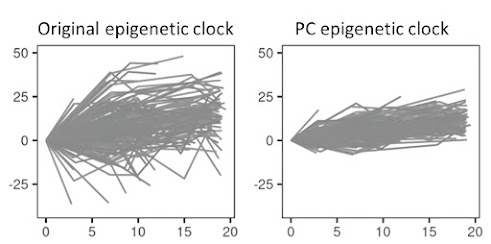Epigenetic clocks based on DNA methylation data are a type of biomarker that is useful for estimating biological age in population-based cohorts. However, usability has been limited by partially unreliable estimates due to this. noise in data. In a new study, we present a solution by introducing a method that reduces the noise in the epigenetic clocks for improved precision in longitudinal analyzes and clinical studies.
Biomarkers for aging can be obtained from cellular, molecular, functional and physiological measurements and used to study biological aging in humans. Many studies use the so-called "epigenetic clocks" based on DNA methylation data to analyze the relationship between biological aging and morbidity and mortality. Although these watches are currently considered to be the best predictors of biological age, they still include technical noise, leading to great variation in the measurements.
In order to make the clocks more useful for longitudinal analyzes and clinical studies, improved precision in the measurements is important. Here we present a method where principal component analysis (PCA) is used to separate noise from age-related signals. In this way, only biologically relevant signals are prioritized and the reliability of the PC watches is much higher compared to the original watches.
The study was led by a research team at the Yale School of Medicine; Assistant Professor Albert Higgins-Chen, PhD, and Morgan Levine, PhD, who recently moved to the newly started Altos Labs in San Diego, USA. Dr. Higgins-Chen, the first author of the study, says "We noted some epigenetic watches where you are biologically 50 years old on one test, and then 59 on the next. We started with existing watches that are often used, and found that a single change - the addition of a technique called principal component analysis - could preserve the aging signals while dramatically reducing noise. Now, for most tests, two measurements made at the same time will differ by less than a year. This also means that a person's longitudinal change in epigenetic age is much more likely to reflect real biological aging rather than technical noise."
 |
| Sara Hägg, senior researcher at the Department of Medical Epidemiology and Biostatistics. Photo Credit: Gunilla Sonnebring |
From Karolinska Institutet, the associate professor contributed Sara Hägg, PhD, and her research team for the study of analyzes of the PC watches in the longitudinal Swedish Adoption Twin Study of Aging (SATSA) with up to five individual measurements made over 20 years. "We could see a dramatic improvement in the variation in epigenetic aging longitudinally with the PC clocks compared to the old clocks in the SATSA study", she says. "Most likely, the epigenetic clocks will be further improved in the coming years, with more specialized applications for aging research. We will continue to work with the Yale Group to contribute to this and utilize the fantastic data we have in Sweden” summarizes Sara Hägg.
The study was published July 15, 2022 in the new specialized journal Nature Aging
Source/Credit: Karolinska Institutet
bio081722_01








.jpg)